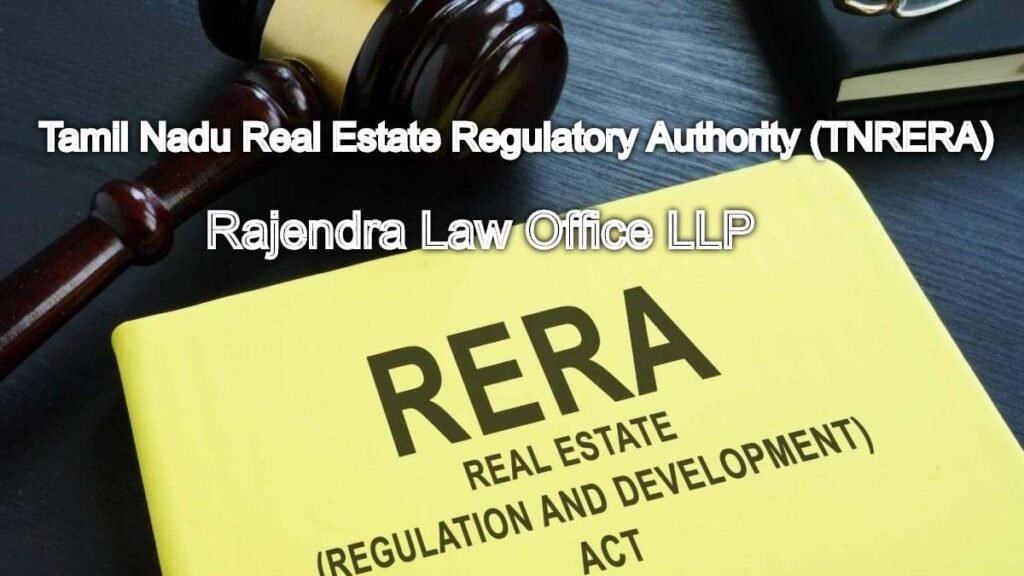Navigating Tamil Nadu Real Estate Regulatory Authority (TNRERA) Proceedings: The real estate sector in India, particularly in Tamil Nadu, has witnessed significant growth in recent years. However, this growth has also been accompanied by challenges, including delays in project completion, disputes between buyers and developers, and concerns about transparency. To address these concerns, the Real Estate (Regulation and Development) Act, 2016 (RERA) was enacted. This act established the Tamil Nadu Real Estate Regulatory Authority (TNRERA), a regulatory body empowered to safeguard the interests of home buyers and promote a fair and transparent real estate market.
Navigating Tamil Nadu Real Estate Regulatory Authority (TNRERA) Proceedings: Legal Expertise in Chennai: Rajendra Law Office LLP
Understanding TNRERA Proceedings
If you find yourself embroiled in a real estate dispute in Tamil Nadu, TNRERA provides a platform for seeking redressal. However, navigating the intricacies of TNRERA proceedings can be a daunting task. This is where legal expertise from a reputable law firm like Rajendra Law Office LLP in Chennai becomes invaluable.
Rajendra Law Office LLP: Your Guide Through TNRERA
Rajendra Law Office LLP boasts a team of highly qualified and experienced lawyers who possess a thorough understanding of TNRERA regulations and procedures. They can guide you through every step of the process, from filing a complaint to presenting your case before the authority and securing a favorable outcome.
Key Stages of TNRERA Proceedings
Here’s a breakdown of the key stages involved in TNRERA proceedings, along with how Rajendra Law Office LLP can assist you:
- Complaint Filing: The first step is to file a well-drafted complaint with TNRERA, outlining the specifics of your grievance against the developer. Rajendra Law Office LLP’s legal team can meticulously analyze your case and draft a comprehensive complaint that effectively presents your arguments.
- Mediation: TNRERA encourages amicable settlements through mediation. Rajendra Law Office LLP can represent you effectively during mediation proceedings, ensuring your rights and interests are protected while exploring potential solutions with the developer.
- Case Presentation: If mediation fails, the case proceeds to a formal hearing before the TNRERA adjudicating officer. Rajendra Law Office LLP’s skilled lawyers will meticulously prepare your case, gather necessary evidence, and present it persuasively before the authority.
- Order Pronouncement: Following the hearing, TNRERA will issue an order. Rajendra Law Office LLP will meticulously analyze the order and advise you on the next course of action, which may involve appealing the decision if necessary.
Benefits of Seeking Legal Expertise
Engaging Rajendra Law Office LLP for TNRERA proceedings offers several advantages:
- In-depth Knowledge: The team possesses a deep understanding of RERA regulations and TNRERA procedures, ensuring your case is handled strategically.
- Strong Advocacy: They will advocate diligently on your behalf, ensuring your voice is heard throughout the proceedings.
- Meticulous Preparation: They will meticulously prepare your case, leaving no stone unturned in securing a favorable outcome.
- Experienced Negotiation: Their skilled negotiators will strive for an amicable resolution during mediation, saving you time and resources.
- Effective Communication: They will keep you informed of every development in your case, ensuring clear and transparent communication.
FAQs: Demystifying TNRERA
Here are some frequently asked questions regarding TNRERA proceedings, answered by Rajendra Law Office LLP’s legal team:
You can file a complaint with TNRERA for various reasons, including delays in project completion, deviations from approved plans, structural defects, or non-compliance with payment schedules.
The documents required may vary depending on the nature of your case. However, they typically include a copy of the sale agreement, allotment letter, payment receipts, and any communication with the developer regarding the dispute.
The fee for filing a complaint depends on the value of the property involved. It’s advisable to consult with a lawyer at Rajendra Law Office LLP to determine the exact fee applicable to your case.
The duration of TNRERA proceedings can vary depending on the complexity of the case and the workload of the authority. However, Rajendra Law Office LLP will work diligently to expedite the process wherever possible.
If you are dissatisfied with the TNRERA order, you have the right to appeal to the TNRERA Appellate Tribunal. Rajendra Law Office LLP can guide you through the appeals process.
Read More
- Real Estate Lawyers for Property Transactions in India: Expert Advice
- Legal Support for Real Estate Transactions: Expert Advocacy
- Immigration Lawyers in Chennai: Your Gateway to a New Beginning
- Navigating Subordinate Courts in Chennai: Legal Representation and Defense
- Bankruptcy Lawyers in Chennai for Debt Restructuring
- TNRERA Website:

